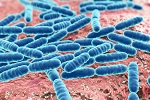
Autism is so common in the US now that Sesame Street has characters with Autism spectrum disorder on the show. One in fifty nine children in America has ASD and most are diagnosed between two and four years old. While a fringe group of people wrongly blame vaccines for causing the disease, we actually don't know why kids develop it. For now no therapy can cure the illness, but one recent study suggests altering the bacteria in the gut might help.
That might sound strange but having good health actually depends on having the right microbiome in and on us. These are the bacteria, fungi, and viruses that coexist with us and even outnumber our own cells. Extensive research shows that changing our gut microbiome can cause weight gain, intestinal disorders, and even alter brain function.
This study on autism suggests that a bacterium in our gut microbiome named Lactobacillus reuteri may play a role in brain function and social behavior. It's in our intestinal tract as well as in other mammals.
In experiments with mice that share human characteristics of ASD, this bacterium reversed social deficits. It didn't merely alter the mouse gut microbiome, but had a direct effect on the vagus nerve. In humans, this nerve is critical in controlling our heart rate and proper function of our gastrointestinal tract. It's like a brain gut superhighway which helps to explain why altering the gut microbiome can affect what's ultimately a brain function in ASD.
Tests need to be done in humans to see if the theory pans out. But it's a pretty exciting possibility.
More Information
Autism Spectrum Disorder
Autism spectrum disorder (ASD) is a developmental disorder that affects communication and behavior. Although autism can be diagnosed at any age, it is said to be a 'developmental disorder' because symptoms generally appear in the first two years of life...
Role of the Gut Microbiome in Autism Spectrum Disorders
The gut microbiota is believed to play a pivotal role in human health and disease through involvement in physiological homoeostasis, immunological development, glutathione metabolism, amino acid metabolism, etc., which in a reasonable way explain the role of gut-brain axis in autism...
Mechanisms Underlying Microbial-Mediated Changes in Social Behavior in Mouse Models of Autism Spectrum Disorder
Precision microbial-based therapy rescues social deficits in genetic, environmental, and idiopathic mouse models of ASD. This rescue depends upon the vagus nerve as well as the oxytocinergic and dopaminergic signaling in the brain...